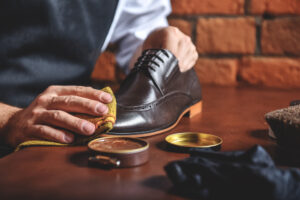
It was once the staple of any family utility room, ready to be deployed on a Sunday evening before the weekly return to school or the office.
But Kiwi shoe polish, once a household name, is soon to be a thing of the past, after the manufacturer decided to stop selling the product in the UK.
The firm said the decline in the habit of polishing shoes – as a result of growing numbers of people working from home and the rise of ubiquitous trainers – has led it to focus on other markets.
A Kiwi spokesman said it has seen a fall in the number of Britons polishing their shoes, coinciding with a “rise in casual shoes that don’t require formal polishing”.
The firm added that it would still sell products in countries where formal shoe care “remains relevant”.
Kiwi polish is bought in at least 120 countries around the world and accounts for more than half the polish sold globally, with office workers and members of the armed forces – where a mirror-like sheen on boots and leather belts is expected – supplying much of its customer base.
David James, whose London family shoe repair and cleaning firm was founded 100 years ago, said Kiwi’s decision was “a sign of the times”.
The 62-year old said: “It is what you did on a Sunday night before school or work for the week, but those days are fast fading. Some people come in and have never polished them, they don’t even know how to do it.”
Mr James, who has shoe-shine chairs in London’s Canary Wharf, added: “In part this is because people wear suits and smart shoes much less. Covid accelerated that with more working from home, but a trend was in place before then.
“Also, trainers are being worn more and more – even to work. While shoes are dying, trainers are alive. We now renovate sneakers – repair and paint them.”
Romi Topi, founder of TopShine in London’s Burlington Arcade, said: “Covid-19 has definitely changed the culture of what people wear at the moment. We’ve gone into that trend of being too casual. “People work from home and those few days that they are working in the office, they look like they’re just coming out from the gym. The City is more like a university campus now.”
However, at least one manufacturer has its eye on any gap in the market that Kiwi’s departure may leave.
Cherry Blossom, the British firm, which like Kiwi launched in 1906, sees its UK exit as an opportunity.
Natasha Seal-Jones, its head of marketing, said: “There’s always a place for a shine in your step. Be it a job interview, a wedding or a party, having shiny, clean shoes gives confidence and that need will never disappear. We want to give that confidence.”
Kiwi was created by William Ramsay, an Australian who gave it the name because his wife Annie was a New Zealander.
Mr Ramsay’s polish became increasingly popular amid demand from soldiers in the British and US armies during the first world war.
It was bought by Sara Lee Corporation in 1984, before being sold in 2011 to SC Johnson, which now wants to focus on its range of other cleaning products.
SC Johnson said in a statement: “After a thorough evaluation, SC Johnson (SCJ) has decided to exit the Shoe Care business in the UK in order to redirect our investments and resources to the company’s strategic businesses and initiatives.
“With this decision, Kiwi will no longer be distributed by SCJ in this market.”
Read more:
Kiwi shoe polish to disappear as UK no longer cares about shiny shoes

